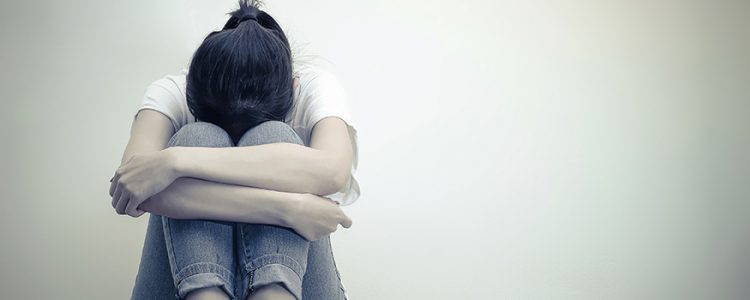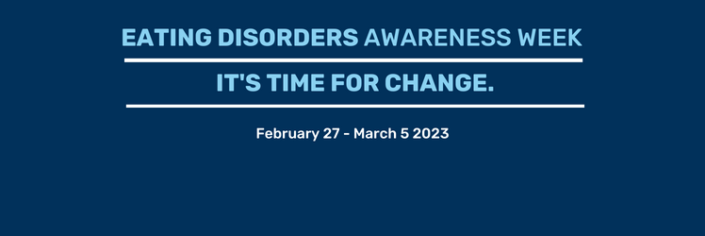An eating disorder diagnosis can be challenging enough on its own, but many individuals also have other psychological issues that can accompany the eating disorder.
Sometimes, the other disorder may be a result of eating disorder behaviors, as binging, purging, and restricting can all cause psychological distress. Other times, another psychological disorder can begin around the same time as an eating disorder, it can precede it, or it can crop up after the eating disorder has already begun. And some mental disorders can be risk factors for eating disorders, indicating that a person may be more likely to later develop an eating disorder.
Below, six NEDA writers share their experiences of living with and recovering from an eating disorder and co-occurring conditions. Read their stories:
I Am More
Tori Lilly: Eating disorders are one of the hardest things someone can ever battle in their lifetime. But when someone has to battle an eating disorder and a co-occurring mental illness, it becomes a nightmare. I would know. I was diagnosed with anorexia nervosa, major depressive disorder, and generalized anxiety at the age of fifteen. I was put into a treatment center to start my recovery from anorexia nervosa when I was first diagnosed.
At the time, the eating disorder was the first thing that needed to be addressed. I was dangerously ill and that needed to be dealt with in the moment. The treatment center was very good and knew how to deal with and treat those with eating disorders. But I think that they lacked the resources to deal with other disorders. It is not easy to treat someone with an eating disorder, but it becomes much more complex when that is not the only mental illness to fight.
I was put into intensive programs for treating and recovering from the anorexia nervosa, but little was done to deal with my depression and anxiety. They did have a psychiatrist and I was given medication to help. I was put on two different medications to deal separately with both the anxiety and the depression. It was effective and I was doing therapy and was dealing with both the eating disorder and the other two problems. The problem that arose was when I went home.
Before I left, the treatment center had decided that I no longer needed to be on my anxiety medication and that I should have my depression medication dosage lowered. Now, I am all for not being completely dependent on medications, but sometimes there are chemical imbalances that need to be addressed and sometimes the best way to treat that is with medication. It was not easy going home from treatment in the first place. I was still fighting the “ED” thoughts every day and was still on a weight gain plain. Now, I also had to fight the inner demons of depression and anxiety.
Thankfully, I had an amazing support team at home. I was slowly but surely able to kick “ED” in the butt and say goodbye to him forever. But I know that the recovery process was much harder than normal since I was also struggling with depression and anxiety. I continued to struggle with depression and anxiety much longer than I did with my eating disorder. I struggled when I went away to college and was put on different medication to help deal with the depression. I remember making a conscious decision one day that I was going to beat this.
It occurred to me that I had worked so hard to beat ED, but for some reason was not working hard to beat these other illnesses that were slowly destroying me. I decided one day to treat them the same way I treated my eating disorder. I knew that I wanted to get rid of them and wanted to kick them out of my life. I’m not saying it was easy because, as you know, kicking ED out of my life wasn’t easy, either. But I do know that once I made a conscious decision that I was going to beat my mental illnesses and that I am so much more than just my depression and my anxiety, I started to succeed in life so much more.
I am blessed to say that I am doing very well now. Does that mean I am perfect? No. Does that mean I do not have bad days? No. What it does mean is that when I do have bad days I remind myself that I am strong. I remind myself that I am more than my mental illnesses. I remind myself that I have friends and family who love me. I remind myself that I am living a full and wonderful life.
Facing My Fear
Katrin Alyss: After my car accident in 2003, I had terrible PSTD. I saw my therapist twice in 2004, but then I lost my insurance and had to wait until we got better insurance. I started therapy again officially in 2005. I focused on the aspects of the PTSD and processed the accidents. The eating disorder wasn’t even a focus at that time.
Over time, I thought that I did enough processing with the accident to be free of the effects of the PTSD. When my eating disorder emerged again in 2013, I had to deal with PTSD all over again. I tried to deal with that and push the PTSD to the back of my mind.
When my therapist told me that, “If I went under a certain target, she would talk to my husband about possible hospitalization,” it scared me, because I remember the time when I was hospitalized after the accident. I had no control and it flared up the PTSD aspect. I worked on not going into the hospital.
In 2015, the PSTD flared up due to a minor collision on the freeway and on the way home, two EMS’s were following me. I did more work on the PTSD with my therapist. Also, this past May 2016, I ended up going to the same hospital that I went to after the accident. It felt good to go there and face my fears. I also went to an open house at the fire department in October of 2016 to face my fear by looking at a smashed up car. It really helped! I am happy to say that when I hear a fire truck or EMS go by, I don’t freeze up or get scared.
I know that through processing with my therapist, I will be able to continue to cope with PTSD symptoms.
Giving up the Quest for Perfection
Stephanie Ziajka: Growing up, I was called “perfect” more times than I could stomach. Aside from the obvious notion that nobody can actually be perfect, this label set a criterion for how I felt I needed to look and act. I didn’t grow up in an ideal family atmosphere – who does nowadays, though?
My two older brothers and I learned how badly rejection could burn before we reached double digits in age. Our dad left our mom, closed all of her bank accounts, and transitioned into domestic bliss with his Nurse Practitioner while our mom battled severe manic depression. In the midst of my parents’ traumatic and utterly bitter divorce, our well-being became collateral damage. While my brothers received years of mandated counseling, my performance as a seemingly well-adjusted and undaunted popular, private school kid was Oscar worthy. I was secretly stifling routine panic attacks, severe anxiety, and clinical depression, and nobody suspected a thing.
When I got a bit older, I decided to take classical voice lessons. I’d always dreamed of competing on the Miss America stage, and after a few vocal coaches suggested I try my luck in pageantry, I finally did. At age 22, the year I started competing, the rush of attention and validation was so overwhelmingly gratifying. However, this gratification, like all superficial self-seeking validation, didn’t last. In what felt like an instant, I went from a Top 10 state contender one year to just another girl who couldn’t manage to win a local pageant the next. I felt like my value, every last drop of it, had been depleted. Since I stopped identifying as a standout in the judges’ eyes, I wanted to be a standout in the minds of everyone I came across. I was determined to be as close to physical perfection as possible, and this quest for excellence came at the expense of my mental and physical health.
As my anxiety, depression, and obsession with weight reached their peaks, I developed anorexia, bulimia, and orthorexia. I fixated on my every bite, every pound, and every calorie. My desire to be thin literally took over every positive quality of my life, and my eating disorder just sat and lingered, watching as it relentlessly propelled me further and further down into a spiral of loneliness and depression. I started to believe that my physique was the only redeeming quality I had left. I mastered the art of the “I’m fine” façade early on in life, so my behavior went unnoticed for months before friends confronted me about my eating habits. I hated hearing them sound so disappointed in me, yet I still let my anxiety about my appearance overshadow their pleas for treatment. In retrospect, I was too embarrassed to admit that I felt inadequate in so many areas of my life, and since my eating was the only thing I felt like I could control, I kept trying to control it.
After a frighteningly close call in the hospital, I agreed to see a counselor, started taking medication for my depression and anxiety, and eventually enrolled in both inpatient and outpatient rehab programs to turn my life around. It’s taken some time to get to the point where I’m at now, and even to this day, my journey to eating disorder recovery remains the hardest and most arduous process I’ve ever undertaken. Although I still struggle with body image issues from time to time, I know I wouldn’t be alive today if I hadn’t sought help. I wouldn’t have as much self-love as I have at this very moment, and I wouldn’t be so cognizant of the fact that mental illness isn’t a choice; it’s a disease. Just like a physical disorder, seeking treatment is the first step in mitigating the pain.
Dropping the Façade
Annabelle Edge: I have been struggling with OSFED, which has co-occurred with anxiety, depression, and high-functioning autism. Whilst I don’t see my autism as a specific illness, more a condition, it has caused difficulties in my recovery as I am limited in textures and can become very obsessed with numbers and calories.
It was always hard dealing with OSFED and my co-occurring conditions, due to the stigma I experienced from the outside world. As a woman with autism, I learned to mask my condition and lack of understanding from everybody. This may have helped me feel and look as though I was fitting in but when it came to anybody realizing that I was struggling, I was too efficient at hiding. People then got the impression that I was lying and refused to see past the façade I was showing to the world.
Finding someone who could help with all of my conditions was really useful. When I was referred to ED services, it was difficult for them to help me because I didn’t just have an eating disorder, I had a number of other things. When someone started to see the whole me, I was then able to see what I was doing and the behaviors that I was using against myself. In taking everything into account, I was able to challenge not only my eating disorder, but everything else I was dealing with. It also allowed me to release some of the pressure on myself and to give myself a break.
Patience and understanding are definitely keys in recovering from an eating disorder and seeing that it does not have to consume your entire life. Things aren’t cut and dried and they don’t have to be; you are a person outside of an eating disorder.
Embracing Full Recovery
Michelle Zaydlin: It seemed as though the cycle was never ending. It was always one thing or another. The eating disorder got loud and began to quiet the self-harm urges, the depressive thoughts, and the anxiety racing through my mind. As I began to work on recovery from the eating disorder, the other thoughts seemed to get louder, to compensate for the lack of the eating disorder screaming in my ear. My thoughts would begin to race, my self-harm urges would feel constant, or my depression would get so severe that I couldn’t find the energy to get out of bed at all. It felt as though I was stuck in a never-ending spiral, and if it wasn’t one condition rearing its ugly head, it was the other.
However, the further I went into my recovery and the more willing I was to address the other thoughts running through my mind besides the eating disorder, the more I realized how connected everything was. My eating disorder, at times, served as a form of punishment, of self-harm. It was a way to deprive my body of what it needed; yet, it didn’t leave a visible scar so it took me years to recognize the connection between the two.
My anxiety fueled my eating disorder and my eating disorder convinced me that the only way to decrease my anxious and obsessive thoughts was to focus them in one place, on food. Then, I would disobey my eating disorder, or become completely engrossed in it, both of which led to worsening depression. The more I deprived my body, the louder the anxiety and depression got, and the cycle continued.
Realizing this connection allowed me the power to embrace recovery more fully, and to be more open about what issues were beneath my eating disorder besides a superficial desire to lose weight and feel happier about my body. Working through depression, anxiety, and self-harm along with my eating disorder provided me with a more holistic recovery, and a more stable one. It taught me to question what purpose my eating disorder was serving and to identify healthier ways in which I could meet my needs. It taught me to be honest about all of my struggles, even those that carried shame, and it taught me to really recognize the root of my struggles. While having multiple challenges has been a struggle at times, identifying and working through all of them has provided me with a deeper understanding of myself, and a more stable and solid recovery.
You Are Worth Saving
River Ceballos: I’m not going to lie: while writing this, my hands are shaking. I’ve prided myself on being honest and making a successful career as an activist by telling my whole story, living my truth. My struggle with an eating disorder and body image issues are very public. I figure that if people can learn from my mistakes, then I haven’t suffered in vain.
But there’s something that has played a key role in my struggle that I haven’t spoken about publicly until now. You know, growing up in the entertainment industry is like living in a different world. People walk differently, think differently, love and hate differently. It’s almost like Hollywood has its own set of rules. Growing up as a child actor in itself inflicted major pressure on me, but being the chubby one on top of that was even harder.
Drugs are as common in this industry as daily casting calls – they’re everywhere. As I got older and started going to LA on my own, picking my own roles, and signing my own contracts free from the reigns of parental guidance, I really got a feel of Hollywood life like I’d never seen it. By this time, I was 18 and had lost a good amount of weight. I wasn’t exactly classified as “thin” but I was “healthy.” Like I’ve mentioned in interviews and articles before, I wanted to keep the momentum of “WOW. You look great! How’d you lose so much weight?” going that I decided to try cocaine for this first time while out at a night club in Hollywood.
I had heard that it gave you energy for those grueling hours spent on set and how it could suppress my appetite. That alone had me intrigued. But I learned very quickly that I wasn’t the only one my age who had tried a substance for similar reasons.
I remember there was a point BEFORE the substance abuse when my peers accused me of drug use because I was losing weight so rapidly and because I was afraid to admit that I was a male with an eating disorder. I never denied the accusations. Everyone had already viewed me this way so why not, right? Looking back, I can almost pinpoint the exact moment where I went wrong and how I could’ve prevented all of it. I see now how warped and dangerous my ways of thinking were. The pattern of abuse continued off and on for years. Whenever I was feeling down about myself and wanted that extra push, I’d turn to cocaine.
I voluntarily admitted myself into a rehab center in early November 2016 for my mental health issues as well as the patterns of my eating disorder and substance abuse creeping back up. I knew that I was on the fast track to nowhere good. I was losing control and my issues were all too consuming. I felt like I was in high school again. The same pattern of pushing people away, not giving anyone or anything my full attention, and not being able to recognize the person staring back at me in the mirror both physically and figuratively.
Seeking out treatment for ALL my issues was the hardest, scariest, most beneficial thing I ever could’ve done for myself and I thank god every day that I surrendered. It has been quite the journey and I’ve learned more about myself than I thought was possible. I hope that by telling my story and being 100% honest that I’ll inspire somebody, somewhere. I know I am not alone in this battle of mine and that there are others out there like me. We are not bad people and we are not to be frowned upon; we are humans, we get lost, and we get scared. We cope in the only ways we think we can. I want you all to remember that you are more than your addictions, you are stronger than your demons and you’re worth saving.





